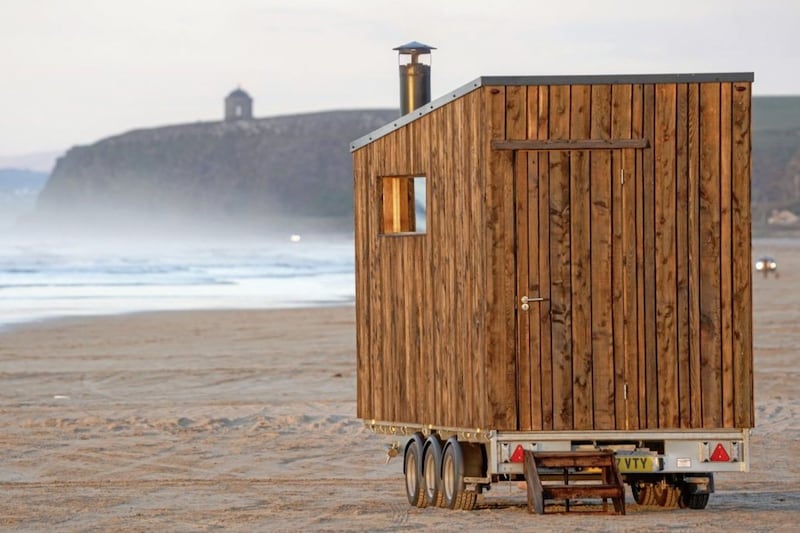The family of a young Lisburn boy with a life-limiting condition have talked about their positive experience of palliative care.
Eoin O’Neill (10) was born with a rare genetic condition, Cri-du-chat syndrome, with the complications including hearing and sight loss.
With very small airways, he needs to be tube fed and has had an artificial airway since he was a week-old.
As Eoin is non-verbal, he remains silent even when he cries but communicates using facial expressions and body language.
- Crisis in care for dying people says Marie Curie as survey shows sufferingOpens in new window
- GPs warn thousands of NI pensioners will be at risk over cuts to winter fuel paymentOpens in new window
- ‘Driving into work was painful’ - NI consultant has no regrets about move to Republic to escape struggling NHSOpens in new window
Speaking to The Irish News to mark Palliative Care week, his mother Ann-Marie (45) said that when hospice was first mentioned she felt “sick to her stomach”.
“He was around six months old when hospice was first mentioned and we were absolutely terrified to be honest,” she said.
“We just thought hospice equals end of life and that Eoin wouldn’t be with us for very long.
“But the hospice support we’ve received over the last decade has been an absolute godsend, particularly over Covid-19.”
Struggling with the 24/7 care Eoin needed as a baby, she and her husband John (47) reluctantly agreed to visit Horizon House in Newtownabbey, a children’s in-patient unit run by the Northern Ireland Hospice.
“We thought it would be a very sad experience, but it was just homely and warm,” she said.
“We felt strangely comfortable from the moment we walked in the door. You don’t want to find yourself in that situation, but if you do you can get so much support.”
Eoin’s condition is described as life-limiting, but there is no definitive timeline.
“We don’t know is the honest answer. Having a tracheostomy (artificial airway) is quite risky alone. But we don’t tend to dwell on that too much,” Ann-Marie said.
“To most, palliative care means you don’t have very long left. For us, that means support to enjoy Eoin and the life we have with him regardless of how long that is.”
We have a wide range of resources to help you to share information this coming #pallcareweek, which commences on Sunday, 8 Sept. Help us to raise awareness of the benefits of palliative care and supports available. Access our campaign resources here- https://t.co/jIj2O3mvXX pic.twitter.com/KBnDHRqyM3
— All Ireland Institute of Hospice & Palliative Care (@AIIHPC) September 6, 2024
The service has also been vital for Eoin’s siblings Jay (13) and Aine (8).
“It’s somewhere that’s really important to us as a family. Last week, my daughter and I went to stay with Eoin in hospice for a couple of days.
“We were able to go swimming, which isn’t something we can do anywhere else. So we’re making those memories, not just for Eoin, but for all of us to get a chance to do the typical things other families do.”
A new survey from the All Ireland Institute of Hospice and Palliative Care (AIIPHC), has said that 69% of adults in Northern Ireland feel fearful when hearing the term palliative care, and around nine in ten only think of end of life care.
There were also positive perceptions, with 89% thinking palliative care can support family and carers and that three-quarters thought it can benefit people over long periods, not just end of life.
Supporting Palliative Care Week, the Health Minister Mike Nesbitt said: “By talking about palliative care, we can challenge the misconceptions around what it is and when it is appropriate. Those conversations are crucial to helping people feel confident in asking healthcare providers for help and finding out what support is available in their community.”
Those wishing to learn more about palliative care can visit thepalliativehub.com for more information.
The Health Minister has encouraged people to talk about palliative care this Palliative Care Week 🗣️
— Department of Health (@healthdpt) September 9, 2024
Minister Nesbitt said talking is "crucial to helping people feel confident in asking healthcare providers for help".
➡️More: https://t.co/r3zcJle207#pallcareweek @AIIHPC pic.twitter.com/9iMVSj7g9l









